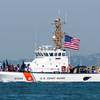Speakers Outline Security Issues at London Conference
He said three recent incidents appeared to vindicate this view: The small boat bomb attack on the double-hull tanker Limburg off the Yemen, in which only some 300 tons of oil were spilt; the small boat bomb attack on the USS Cole - a single-hull vessel - also in the Yemen which caused great damage and loss of life; and the accident to the double-hull tanker Baltic Carrier off Denmark, which lost only a moderate amount of cargo, despite being rammed and penetrated at right angles by a bulk carrier. Dr. Payer said that as the leading class society in the development, technology and classification of containerships, GL had decided to focus a particular part of its new security services on containerships, their owners, and the container logistics chain. "Over 70 percent of all dry cargo is transported in containers, with further rapid growth predicted. Containers are seen as critical to security – the ideal means of carrying weapons of mass destruction to the heart of continents and cities. No aspect of the transport industry will escape intense scrutiny, including ships, terminals, shippers and inland transporters."
"There is the potential to wreck havoc on the entire world logistics chain if container shipping fails to comply with security regulations," he said. "It is faced with an awesome challenge and responsibility – not to mention ruinous costs if it breaches security regulations. The upside is security compliance will make the industry more efficient, transparent and predictable, and will also enhance safety." He said the human factor was as important in security as it was in the safety field where most catastrophic accidents were caused by human error. A potential danger was that crews already burdened with safety requirements could be overloaded in complying with security regulations as well, lowering their effectiveness. "Human vigilance is vital in preventing acts of terrorism. An essential aspect of the human factor is to think outside the 'predictability box' because terrorists take advantage of predictability, their strength being surprise and unpredictability".
Based on their experience of implementing the ISM Code, class societies were well suited to auditing and certifying security systems as Recognized Security Organizations (RSOs), Dr. Payer said. "The principal societies have begun intensive training of their ISM auditors in cooperation with security consulting firms, in order to have a comprehensive auditing and certification network in place very shortly in strategic locations around the world." Dr Payer concluded: "Never at any time in the long history of the maritime industry have the key players – owners, operators, flag states, class societies, bankers, insurers, charterers, shippers and ports states – been motivated to work so closely together to the same purpose, namely the protection of our mutual interests."
Maitland: ISPS Code Could Signal End of Substandard Registers Clay Maitland of managing partner of IR predicts that the new ISPS Code could signal "the beginning of the end of substandard registers He said enhanced safety was one of the "bonus dividends" that the code would yield because heightened international security controls would "separate the men from the boys" and help eliminate substandard safety practices in the maritime industry. "The code would also break new ground by denying ship operators, owners and charterers from taking advantage of matters previously regarded as secret or confidential. It also puncture the notion of national sovereignty as a means of evasion of responsibility."
He said it was vital that the ISPS Code was made to work. "We must avoid a whitewash and another white list fudge where even the laggards get certificates of good conduct. That would be a recipe for future disaster, perhaps with tragic results." He told delegates that flag state administrations should be subject to international audit and review, through the IMO, and that the ISPS Code was a stepping stone in that direction. Responsible flag states should attach a great deal of importance to the Continuous Synopsis Record to be carried aboard vessels under ISPS, which gave a history of the vessel. He said the Marshall Islands registry was reinforcing its security regime in several ways. "As a condition of entry to the registry we require to know the identity of the beneficial owners of all vessels. We do not arbitrarily disclose this information as it might be of use to terrorists. But it will be part of the vessel's record, and if necessary will be made available to security agencies or if the vessels becomes a casualty in an accident."
The registry was also developing a biometric-inclusive seafarer identification system. All the registry's systems were being secured against unauthorized access. IRI was also expanding the capabilities of its own safety department. It would be able to validate ship security plans and issue vessels' continuous synopsis records. In addition, it would validate international security certificates, and recognize and monitor all RSOs (Recognized Security Organizations). He said that to effectively implement its global maritime anti-terrorist mission, the United States will require intelligence from private sector organizations, including charterers, freight forwarders and bunker suppliers. "The US government will have to have to develop systems of sharing information with private concerns as well as obtaining it. There is, as yet, no apparent means of doing this, particularly with ship registry administrations."










